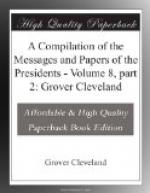This fact would be no excuse for delaying payment of what is justly due, but it shows the great importance of time in this connection—the great advantage of a policy by which we shall not have to pay until we number 100,000,000 what by a different policy we would have to pay now, when we number but 31,000,000. In a word, it shows that a dollar will be much harder to pay for the war than will be a dollar for emancipation on the proposed plan. And then the latter will cost no blood, no precious life. It will be a saving of both.
As to the second article, I think it would be impracticable to return to bondage the class of persons therein contemplated. Some of them doubtless, in the property sense belong to loyal owners, and hence provision is made in this article for compensating such.
The third article relates to the future of the freed people. It does not oblige, but merely authorizes Congress to aid in colonizing such as may consent. This ought not to be regarded as objectionable on the one hand or on the other, insomuch as it comes to nothing unless by the mutual consent of the people to be deported and the American voters, through their representatives in Congress.
I can not make it better known than it already is that I strongly favor colonization; and yet I wish to say there is an objection urged against free colored persons remaining in the country which is largely imaginary, if not sometimes malicious.
It is insisted that their presence would injure and displace white labor and white laborers. If there ever could be a proper time for mere catch arguments, that time surely is not now. In times like the present men should utter nothing for which they would not willingly be responsible through time and in eternity. Is it true, then, that colored people can displace any more white labor by being free than by remaining slaves? If they stay in their old places, they jostle no white laborers; if they leave their old places, they leave them open to white laborers. Logically, there is neither more nor less of it. Emancipation, even without deportation, would probably enhance the wages of white labor, and very surely would not reduce them. Thus the customary amount of labor would still have to be performed—the freed people would surely not do more than their old proportion of it, and very probably for a time would do less, leaving an increased part to white laborers, bringing their labor into greater demand, and consequently enhancing the wages of it. With deportation, even to a limited extent, enhanced wages to white labor is mathematically certain. Labor is like any other commodity in the market—increase the demand for it and you increase the price of it. Reduce the supply of black labor by colonizing the black laborer out of the country, and by precisely so much you increase the demand for and wages of white labor.




